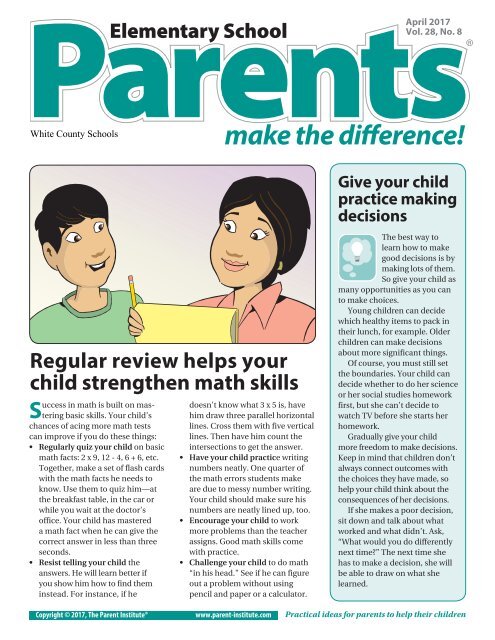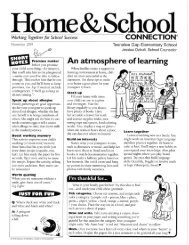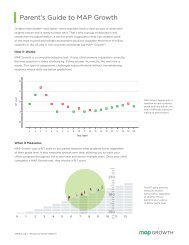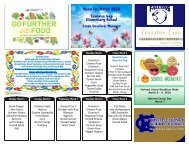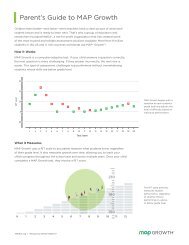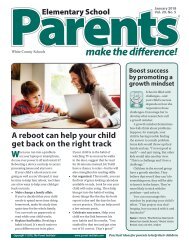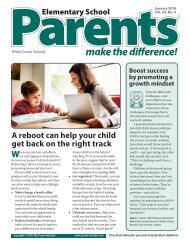elemapr17
Create successful ePaper yourself
Turn your PDF publications into a flip-book with our unique Google optimized e-Paper software.
April 2017<br />
Vol. 28, No. 8<br />
®<br />
White County Schools<br />
make the difference!<br />
Regular review helps your<br />
child strengthen math skills<br />
Success in math is built on mastering<br />
basic skills. Your child’s<br />
chances of acing more math tests<br />
can improve if you do these things:<br />
• Regularly quiz your child on basic<br />
math facts: 2 x 9, 12 - 4, 6 + 6, etc.<br />
Together, make a set of flash cards<br />
with the math facts he needs to<br />
know. Use them to quiz him—at<br />
the breakfast table, in the car or<br />
while you wait at the doctor’s<br />
office. Your child has mastered<br />
a math fact when he can give the<br />
correct answer in less than three<br />
seconds.<br />
• Resist telling your child the<br />
answers. He will learn better if<br />
you show him how to find them<br />
instead. For instance, if he<br />
333333333<br />
doesn’t know what 3 x 5 is, have<br />
him draw three parallel horizontal<br />
lines. Cross them with five vertical<br />
lines. Then have him count the<br />
intersections to get the answer.<br />
• Have your child practice writing<br />
numbers neatly. One quarter of<br />
the math errors students make<br />
are due to messy number writing.<br />
Your child should make sure his<br />
numbers are neatly lined up, too.<br />
• Encourage your child to work<br />
more problems than the teacher<br />
assigns. Good math skills come<br />
with practice.<br />
• Challenge your child to do math<br />
“in his head.” See if he can figure<br />
out a problem without using<br />
pencil and paper or a calculator.<br />
Give your child<br />
practice making<br />
decisions<br />
The best way to<br />
learn how to make<br />
good decisions is by<br />
making lots of them.<br />
So give your child as<br />
many opportunities as you can<br />
to make choices.<br />
Young children can decide<br />
which healthy items to pack in<br />
their lunch, for example. Older<br />
children can make decisions<br />
about more significant things.<br />
Of course, you must still set<br />
the boundaries. Your child can<br />
decide whether to do her science<br />
or her social studies homework<br />
first, but she can’t decide to<br />
watch TV before she starts her<br />
homework.<br />
Gradually give your child<br />
more freedom to make decisions.<br />
Keep in mind that children don’t<br />
always connect outcomes with<br />
the choices they have made, so<br />
help your child think about the<br />
consequences of her decisions.<br />
If she makes a poor decision,<br />
sit down and talk about what<br />
worked and what didn’t. Ask,<br />
“What would you do differently<br />
next time?” The next time she<br />
has to make a decision, she will<br />
be able to draw on what she<br />
learned.<br />
Copyright © 2017, The Parent Institute® www.parent-institute.com Practical ideas for parents to help their children
Copyright © 2017, The Parent Institute®<br />
Discover ways to build family<br />
time into your daily schedule<br />
To reach their full<br />
potential in school<br />
and in life, kids need<br />
frequent, meaningful,<br />
undivided attention<br />
from parents. But finding quality<br />
time to spend together can be<br />
challenging.<br />
Here are some ways to build more<br />
family time into your busy schedule:<br />
• Turn off the TV. Simply limiting<br />
TV time can result in several hours<br />
of free time each week.<br />
• Volunteer. If your child is involved<br />
in a club, team or other group<br />
activity, offer to help out. This<br />
is a great opportunity to spend<br />
time together.<br />
• Get moving. It’s important<br />
to squeeze exercise into your<br />
April may bring<br />
showers—but it also<br />
brings many days of<br />
learning opportunities.<br />
Here are some fun things<br />
you can plan to do with your child:<br />
• April 2 is International Children’s<br />
Book Day and Hans Christian<br />
Andersen’s birthday. This day<br />
is designed to inspire a love of<br />
reading. Head to the library and<br />
grab some books!<br />
• April 13 is the birthday of Thomas<br />
Jefferson. Go online to learn more<br />
about this president. Take a virtual<br />
tour of his home Monticello at<br />
explorer.monticello.org.<br />
• April 17 is income tax deadline<br />
day. Talk about the purpose<br />
of taxes. Practice calculating<br />
percentages with your child.<br />
routine. Be active as a family—<br />
go for walks, play tag or kick a<br />
soccer ball.<br />
• Write it on the calendar. Treat<br />
family time like an appointment.<br />
If you can, schedule some oneon-one<br />
activities that appeal to<br />
each child.<br />
• Gather for dinner. Sit-down<br />
meals help kids and parents<br />
connect and can lead to great<br />
conversations. Strive to have at<br />
least one family meal every day.<br />
“Nothing you do for<br />
children is ever wasted.”<br />
—Garrison Keillor<br />
Celebrate the month of April<br />
with these fun learning activities<br />
• April 22 is Earth Day. As a family,<br />
think of something you can do<br />
to protect the earth. Perhaps<br />
you could plant a tree or set up<br />
a recycling station at home.<br />
• April 23 is the day Shakespeare’s<br />
birthday is celebrated. Ask your<br />
child to write a scene for a play<br />
and act it out with friends or<br />
family members.<br />
• April 26 is the birthday of John<br />
James Audubon, who was known<br />
for his studies, drawings and paintings<br />
of North American birds.<br />
Encourage your child to draw<br />
pictures of the birds she sees.<br />
• April 30 is International Jazz Day.<br />
Find a radio station that plays<br />
jazz and listen to it with your child.<br />
Then each of you can describe how<br />
the music makes you feel.<br />
2 • Elementary • Parents make the difference! • April 2017<br />
www.parent-institute.com<br />
How well are<br />
you listening<br />
to your child?<br />
Communication<br />
between you and your<br />
child is very important.<br />
You want him to know<br />
that he can talk to you<br />
about school problems or difficult<br />
situations he may be facing. But<br />
when your child talks, are you really<br />
listening? Answer yes or no to the<br />
questions below to find out:<br />
___1. Do you give your child some<br />
uninterrupted listening time every<br />
day, like when he comes home from<br />
school or at bedtime?<br />
___2. Do you avoid interrupting your<br />
child when he is speaking to you?<br />
___3. Do you tell your child if you are<br />
unable to listen that you want to hear<br />
what he has to say, then set a time<br />
when he can have your full attention?<br />
___4. Do you ask questions if you<br />
don’t understand what your child<br />
is saying?<br />
___5. Do you sometimes rephrase<br />
what your child has said to make<br />
sure you understand?<br />
How well are you doing?<br />
If most of your answers are yes, you<br />
have strong listening skills. For no<br />
answers, try those ideas.<br />
make the difference!<br />
Practical Ideas for Parents to Help<br />
Their Children. ISSN: 1523-1275<br />
1046-0446<br />
For subscription information call or write:<br />
The Parent Institute ® , 1-800-756-5525,<br />
P.O. Box 7474, Fairfax Station, VA 22039-7474.<br />
Fax: 1-800-216-3667.<br />
Or visit: www.parent-institute.com.<br />
Published monthly September through<br />
May by The Parent Institute ® , a division of<br />
PaperClip Media, Inc., an independent,<br />
private agency. Equal opportunity employer.<br />
Copyright © 2017 PaperClip Media, Inc.<br />
Publisher: L. Andrew McLaughlin.<br />
Publisher Emeritus: John H. Wherry, Ed.D.<br />
Editor: Rebecca Hasty Miyares.<br />
Illustrator: Joe Mignella.<br />
®<br />
X02337958
www.parent-institute.com<br />
Read aloud to build your child’s<br />
listening skills and memory<br />
Even if your child<br />
knows how to read,<br />
it’s helpful for you<br />
to continue reading<br />
aloud to him.<br />
Reading aloud gives your child<br />
important quality time with you—<br />
and it exposes him to ideas, concepts<br />
and vocabulary he might not get<br />
otherwise. Each time you read<br />
together, you add to his storehouse<br />
of knowledge and strengthen his<br />
reading comprehension skills.<br />
To boost your child’s vocabulary<br />
skills as you read, define words he<br />
doesn’t know. Then ask if he can<br />
think of words that have a similar<br />
or opposite meaning.<br />
From time to time, see if your<br />
child can figure out the meaning of<br />
an unknown word by how it’s used<br />
in a sentence. Give examples of how<br />
the word might be used in other<br />
Everyone wins when parents<br />
volunteer and get involved!<br />
Have you ever<br />
thought about<br />
volunteering at<br />
school? National<br />
Volunteer Week,<br />
which begins April 23, is the<br />
perfect time to give it a try.<br />
Here are five reasons to get<br />
involved:<br />
1. Your child will benefit. Even<br />
if you’re not in his classroom,<br />
your child will know you’re at<br />
school. He’ll feel important and<br />
he’ll know you think learning is<br />
important, too.<br />
2. You’ll get to know your child’s<br />
teachers and other school staff.<br />
That makes it easier to ask for<br />
help when your child needs it.<br />
contexts. For example, note how<br />
the word sign can be a noun (Look<br />
at the stop sign) or a verb (Please<br />
sign your name here).<br />
As you read, you can also help<br />
your child strengthen other skills,<br />
such as:<br />
• Listening and speaking. After<br />
you’ve read a passage, have your<br />
child tell you what he heard. Ask<br />
specific questions—What did<br />
... do? Why? Where ... ? How ... ?<br />
What color was ... ?<br />
• Memory. Don’t just start reading<br />
where you left off in a book the<br />
night before. First ask your child<br />
to recall where you were in the<br />
story.<br />
• Word recognition. Stop reading<br />
periodically. Ask your child to read<br />
a sentence or two to you. Help him<br />
sound out new words. Then have<br />
him read the sentences again.<br />
3. The school will benefit. Whether<br />
you read to a class, help in the<br />
cafeteria or tutor students in the<br />
library, you’ll be freeing school<br />
staff to spend more time with<br />
kids who need it. And that leads<br />
to more learning.<br />
4. Volunteering is easy. Many<br />
schools offer training to volunteers.<br />
And there are volunteer<br />
jobs that can be done at home,<br />
at night or on weekends. So every<br />
parent can get involved.<br />
5. Volunteering is fun. You’ll meet<br />
other parents in your neighborhood.<br />
You may learn new skills.<br />
And you’ll get a good feeling from<br />
knowing you’ve done something<br />
worthwhile.<br />
Copyright © 2017, The Parent Institute®<br />
Q: My eight-year-old daughter<br />
has tantrums when she gets<br />
angry or frustrated. She’s acting<br />
the same way in school, and her<br />
teacher has asked for my help<br />
in getting her to control herself.<br />
What can I do?<br />
Questions & Answers<br />
A: Elementary-age children have<br />
more stress in their lives than most<br />
parents realize. When they don’t<br />
have the skills to cope with stress,<br />
they may resort to toddler-style<br />
outbursts and crying fits.<br />
However, your daughter’s<br />
success in school and with other<br />
children depends on her learning<br />
how to control her behavior.<br />
To minimize temper tantrums,<br />
first try to figure out what triggers<br />
them. Keep a record of your child’s<br />
behavior for one week. What<br />
happens just before a tantrum<br />
begins? Do you notice patterns?<br />
Then, help her avoid some of the<br />
situations that lead to stress.<br />
Next, give your child tools to<br />
manage her behavior. When she<br />
has a meltdown at home, suggest<br />
that she:<br />
• Take time out. Have her remove<br />
herself from the situation for a<br />
five-minute breather. Let her<br />
return when she feels composed<br />
enough to talk calmly.<br />
• Use calming techniques.<br />
Teach her to breathe deeply,<br />
while slowly counting to 10.<br />
Have her dribble a ball, pet an<br />
animal, or tell herself, “I can<br />
work through this.”<br />
• Throw it out. Have her write<br />
or draw her angry feelings on<br />
paper. Then have her wad the<br />
paper up and toss it away.<br />
• Talk it out. Help your child<br />
become more self-aware. Note<br />
when she’s having a bad day.<br />
Help her name her feelings.<br />
April 2017 • Elementary • Parents make the difference! • 3
• Copyright © 2017, The Parent Institute®<br />
Encouragement<br />
is more effective<br />
than praise<br />
Most parents praise<br />
their children with<br />
phrases like “Great<br />
job!” and “That looks<br />
amazing!” But experts<br />
agree that encouragement has a<br />
bigger effect than praise on a child’s<br />
motivation. So what is the difference<br />
between the two?<br />
Praise:<br />
• Discusses results. “Great job on<br />
the science quiz! You got an A!”<br />
• Uses opinion words such as good,<br />
great, terrific and wonderful.<br />
• Is typically given when your<br />
child has performed as you had<br />
hoped she would.<br />
Encouragement:<br />
• Notices effort and progress.<br />
“Look at that project! I can tell<br />
you’ve spent a lot of time on it!<br />
It must feel good to know you<br />
worked so hard!”<br />
• Uses descriptive words. “You<br />
picked up your room without<br />
being asked. Look at that clean<br />
floor and organized desk!”<br />
• Can be given regardless of your<br />
child’s performance. “That<br />
didn’t work out the way you<br />
planned, did it? I can tell you’re<br />
disappointed, but I know you’ll<br />
try again next week. What do you<br />
think you might do differently<br />
next time?”<br />
The big difference is that words<br />
of praise lead your child to rely<br />
on your assessment of her<br />
accomplishments, while words<br />
of encouragement lead her to<br />
form her own positive assessment<br />
of herself. Encouragement makes<br />
motivation soar!<br />
It Matters: Motivation<br />
Expect your child to succeed,<br />
and her chances for success<br />
improve greatly. Expect her to<br />
come up short, and the odds are<br />
that she will.<br />
Children are usually keenly<br />
aware of how their parents view<br />
them, and they often tailor their<br />
actions to those views. So it’s<br />
very important to have high<br />
expectations—and to express<br />
them to your child.<br />
To set effective expectations:<br />
• Make sure what you expect is<br />
within your child’s abilities. If<br />
you set expectations that are<br />
either too high or too low, your<br />
child may do poorly.<br />
• Let your child know what you<br />
expect of her. Make a list of<br />
expectations. Cover places and<br />
situations such as home, school,<br />
homework, etc.<br />
Kids who are motivated<br />
to learn are likely to<br />
be more successful in<br />
school than those who<br />
are not.<br />
To motivate your child:<br />
1. Be a learner yourself. Let your<br />
child see you read books. Watch<br />
educational programs. Attend<br />
school functions. Try new things.<br />
Show curiosity.<br />
2. Share what you learn. Talk about<br />
new ideas or scientific discoveries<br />
with your child. Discuss things<br />
you read or hear.<br />
www.parent-institute.com<br />
Motivate your child to achieve<br />
by setting high expectations<br />
• Be consistent. Don’t lower<br />
your expectations to make<br />
your child happy. Don’t raise<br />
them because you’ve had a<br />
rough day.<br />
• Set your child up for success.<br />
Give her the ways and means<br />
to meet your expectations.<br />
For example, provide a welllit<br />
study space and necessary<br />
school supplies.<br />
Five strategies can increase<br />
your child’s motivation to learn<br />
3. Show an interest in what he is<br />
learning. Ask questions simply to<br />
learn and share—not to check up<br />
on your child.<br />
4. Let him know you believe he can<br />
learn. If you show faith in your<br />
child’s ability to learn, he will have<br />
more confidence in his ability.<br />
5. Stay positive. If your child has<br />
problems in school, help him<br />
see that problems can be solved.<br />
Meet with the teacher to figure<br />
out ways your child can improve.<br />
Then discuss ways you can work<br />
together to help him succeed.<br />
4 • Elementary • Parents make the difference! • April 2017


